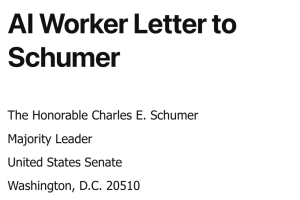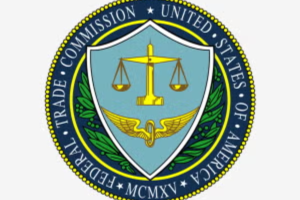Our Work
Founded in 2014, the Center on Privacy & Technology is a leader at the intersection of privacy, surveillance, and civil rights.
Latest Work

“The Past is Here: How Historical Workplace Surveillance Practices Show Up Today” blog
On April 10, 2024, the Center on Privacy & Technology co-hosted a panel with United for Respect, and the Athena Coalition in which the panelists illustrated, through stories like the one above, how contemporary workplace surveillance policies are repeating patterns from the past. Justice Fellow Brandon McClain summarized four key takeaways on our blog. Read the whole blog here.

New Tech, Old Story: How Understanding the History of Worker Surveillance Should Inform Policies and Regulation
In conjunction with Tech & Society Week 2024, the Center on Privacy & Technology co-hosted the “New Tech, Old Story: How Understanding the History of Worker Surveillance Should Inform Policies and Regulation” with United for Respect and the Athena Coalition. The panelists, EEOC General Counsel Karla Gilbride, founder and Executive Director of the Missouri Workers Center Jeremy Al-Haj, and the Center on Privacy and Technology’s Distinguished Fellow Gabrielle Rejouis, discussed how contemporary workplace surveillance policies are repeating patterns from the past. Each panelist outlined how worker surveillance has evolved from slavery to the post-pandemic workplace and how understanding this history can empower people to seek impactful change in workplace surveillance practices.

Distinguished Fellow Gabrielle Rejouis Quoted In InformationWeek
Distinguished Fellow Gabrielle Rejouis was quoted in InformationWeek article "What Is the Future of AI-Driven Employee Monitoring?” She raised concerns about how electronic monitoring can interfere with worker organizing.

Distinguished Fellow Gabrielle Rejouis Speaks at Outbraving Summit
Distinguished Fellow Gabrielle Rejouis spoke on "Black Political Economy, Capital Racism and Technology (Economic & Legal)" panel at Outbraving Summit. On the panel, she spoke about why privacy and algorithmic accountability policies should not be separated. She also discussed why regulations for workplace technology should address the impact of surveillance rather than focus on the technology used.

AI Worker Letter to Chuck Schumer
The Center signed onto a joint letter alongside 23 workers' rights, civil rights, and other civil society organizations calling on Senate Majority Leader Chuck Schumer to center workers and protect their rights in his efforts to address advances in artificial intelligence, such as through his "AI Insight Forum" series, which have to date featured a disproportionate concentration of industry representatives compared to civil society, civil rights, or workers' rights representatives. The letter presents several recommendations and calls on Senator Schumer and Congress to "develop a new generation of economic policies and labor rights to prevent corporations like Amazon from leveraging tech-driven worker exploitation into profit and outcompeting rivals by taking the low road".

Testimony in Support of S.27: An Act to Protect Private Electronic Communication, Browsing and Other Activity
Justice Fellow Meg Foster and Director of Research & Advocacy Stevie Glaberson submitted written testimony to the Massachusetts Joint Committee on Advanced Information Technology, the Internet and Cybersecurity in support of S.27, An Act to protect private electronic communication, browsing, and other activity. The bill establishes warrant and reporting requirements for electronic communication and subscriber records, as well as the use of cell site simulators. It also prohibits law enforcement from requesting, and judges from granting, reverse-location and reverse-keyword requests. The testimony focused on the disparate impact that the dragnet surveillance tools and techniques regulated in S.27 have on marginalized communities, including on their First Amendment rights.

Letter to the FTC on Commercial Surveillance and Data Security Rulemaking
The Center signed onto a joint letter alongside 40 civil rights and technology policy advocacy organizations calling on the Federal Trade Commission to define discrimination as an unfair practice and to require testing of algorithmic systems for discrimination, as part of the Commission's Commercial Surveillance and Data Security Rulemaking. The letter also provided several recommendations for the FTC to develop concrete and specific protections for civil rights.

Comments to the White House Office of Science and Technology Policy
The Center signed onto joint comments spearheaded by the Athena Coalition, submitted to the White House Office of Science and Technology Policy's Request for Information on Automated Worker Surveillance and Management. The submission, which Senior Associate Cynthia Khoo (among others) reviewed and provided feedback on, focuses on the harmful impacts of ubiquitous surveillance and punitive automated management at Amazon on its warehouse workers and delivery drivers. The comments also include a number of recommendations to the Biden-Harris administration to implement in protecting workers from continued exploitation through automated surveillance and management.

Presentation at Labor Research & Action Network Workshop
Distinguished Fellow Gabrielle Rejouis spoke at an LRAN workshop, "American History, Race, Prison, and Surveillance: Atlanta’s Cop City, Extractive Economies and Amazon’s Culture of Surveillance", presenting on the history of worker surveillance. Her presentation connected the history of surveillance to current Amazon surveillance of workers and their support of law enforcement surveillance of Black communities. The presentation drew from the research for the Color of Surveillance: Monitoring Poor and Working People.

Worker Surveillance Panel at RightsCon 2023
Senior Associate Cynthia Khoo spoke on a panel at RightsCon 2023, titled, "Reclaiming and Building Worker Power in an Age of Workplace Surveillance." She joined representatives from Coworker.org, TEDIC Paraguay, and other privacy and technology policy professionals. Cynthia presented on how both privacy laws and employment / labour laws fail to protect workers from surveillance and data-driven harms, and what lawyers, other advocates, and decision-makers can do to address the issue.
